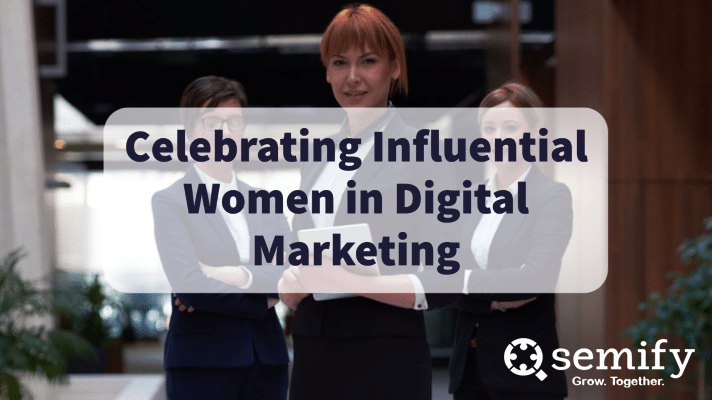
We’ve come a long way in terms of gender equality, but it’s clear that we all have a lot of work to do. At Semify, we thoroughly believe in providing ample opportunities for women in leadership, eliminating gender bias, celebrating the achievements of women, and taking action to promote equality both in the workplace and in the world at large.
To commemorate Women’s History Month (which takes place each March) and to mark the upcoming International Women’s Day, we wanted to explore the essential role that women have played and continue to play in the marketing sector. As a team that’s focused on making history, it only makes sense that we’d pay tribute to the trailblazers who have empowered and inspired us to bring our best selves to work and to fight for equality, representation, and recognition.
An Introduction to International Women’s Day and Women’s History Month
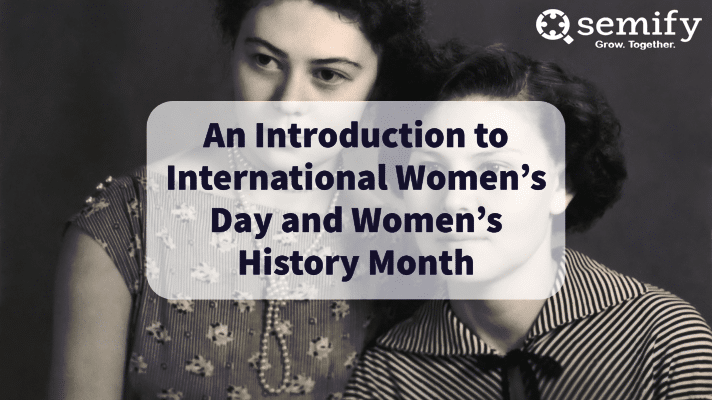
Women’s History Month was originally a shorter celebration that began in 1981 when Congress passed legislation that allowed President Ronald Reagan to proclaim the week of March 7 as “Women’s History Week.” Six years later, the National Women’s History Project petitioned Congress to pass legislation to designate the entire month of March as “Women’s History Month” in 1987. Subsequent presidents have issued yearly proclamations to designate March as Women’s History Month since 1995, allowing for the recognition of contributions and achievements by women throughout our nation’s history.
Now, a variety of organizations — including the Library of Congress, the National Endowment for the Humanities, the National Park Service, the Smithsonian Institution, the National Gallery of Art, the National Archives and Records Administration, and the U.S. Holocaust Memorial Museum — support initiatives “commemorating and encouraging the study, observance, and celebration of the vital role of women in American history.”
International Women’s Day actually has even more historic roots, as the first gathering to commemorate this occasion was held in 1911. In the early 1900s, the inequality and oppression of women spurred unrest and demand for change. Over 15,000 women marched through the streets of New York City in 1908 for voting rights, better pay, and shorter working hours. The following year, National Women’s Day was celebrated in accordance with a declaration from the Socialist Party of America — but it wasn’t until 1910 that the idea of an International Women’s Day was proposed at the International Conference of Working Women.
The next year, International Women’s Day was celebrated in Germany, Switzerland, Austria, and Denmark. Rallies drew more than 1 million men and women to campaign for gender equality and women’s rights. Less than a week later, the devastating Triangle Factory Fire killed more than 140 women working in New York City (many of them Jewish and Italian immigrants). As a result, America became a major focus for International Women’s Day campaigns due to the perceived need for improved working conditions and labor regulations.
It wasn’t until 1975 that International Women’s Day was recognized by the United Nations. And by the early 2000s, interest in feminism had waned. But in 2011, the 100-year anniversary of International Women’s Day, President Barack Obama and then-Secretary of State Hilary Clinton encouraged Americans to reflect on the accomplishments of extraordinary women and sought to empower women and girls to make their own voices heard and make their own contributions to the movement.
Since the 1990s, the U.N. has designated a theme for every International Women’s Day. This year’s theme is #ChoosetoChallenge, which represents the idea of “calling in” others in order to inspire change. Celebrated each year on March 8, IWD aims to celebrate the achievements of women, promote gender equality through awareness and lobbying, and generate funds for women-focused charitable organizations.
This March, we thought it only fitting that we do our part to highlight the powerful and accomplished women in the digital marketing sphere who continue to pave the way. But first, let’s take a look at where we started.
Marketing to Women Vs. Marketing By Women
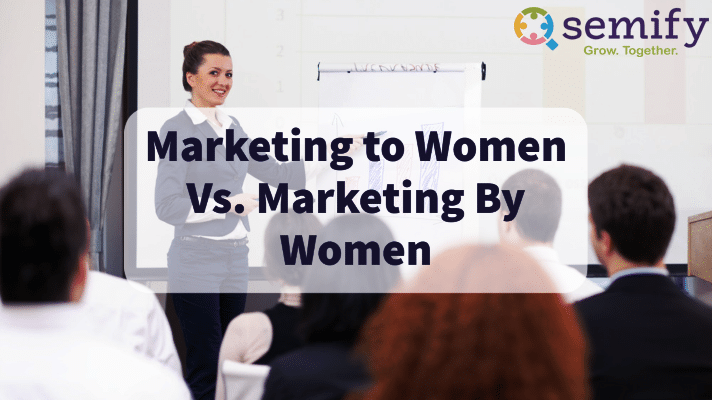
Marketing and women have had a sordid history, to put it lightly. Old advertisements from the 1920s through the 1960s are infamous for their put-together homemaker slant — a concept that feels downright offensive when viewed through a modern lens. Most advertisements directed toward women were geared toward cooking, cleaning, or maintaining one’s appearance. Even as it became more commonplace for women to join the workforce, the emphasis was on homemaking and embodying what marketers felt was the feminine ideal.
Although today’s advertisements may be significantly less misogynistic in tone, 91% of women still say they feel misunderstood by marketers and advertisers. What’s more, men appear at a far greater frequency in advertisements than women do — and when women are shown, they’re more likely to be young, wearing revealing clothing, and shown in the kitchen. They’re much less likely to be portrayed as intelligent or shown as leaders.
That’s especially significant because women make up the majority of consumers and drive 70% to 80% of all purchasing. Data has also shown that women are also more likely to pay attention to and engage with advertisements than men are, making them the ideal target audience for marketing campaigns. If only more businesses really got it right, they’d be set up for success.
A lot of that might come down to greater representation within the marketing sector itself. Fortunately, things have taken a turn for the better in that area. Although it was relatively rare to see women in leadership positions in marketing agencies even as recently as the 1980s, women now outnumber men in strategic planning and media agencies while achieving equal representation in account management. Data from 2019 showed that women made up 51.3% of employees in advertising, public relations, and other related areas, while a Forbes report from 2016 found that women held approximately 60% of professional positions within agencies. And according to a recent ANA study, the number of women in marketing leadership positions has reached new heights. Data reveals that 52% of senior-level marketers and 47% of CMOs at companies surveyed were women. However, ethnic diversity in marketing remains low, which is a huge concern at a time when the fight for equality is at the forefront of American minds.
Another area of marketing where women dominate? Social media management and influencer marketing. Zippia, a careers resource website, estimates that 57.3% of social media managers are women. And while the pay gap certainly does still exist, it’s clear that women are definitely represented in this sphere. Influencer marketing, which is projected to become a $10 billion industry by 2022, is known for being driven by women — a fact that has often resulted in misogynistic attitudes toward the industry as a whole.
Women essentially outpace men in terms of social media usage on virtually every platform and commonly consult social media prior to making a purchase. Since women use more products than men — and products like apparel, personal care items, and food are commonly advertised on social media platforms — they’re a natural fit for both purchasing and promoting. They’re also more likely to share personal information in their posts to connect with others. Because authentic storytelling is an essential part of becoming a successful influencer, it makes sense that women would do well. It’s also worth noting that social media influencers have become modern-day models who take on the work of ad agencies, photographers, and talent. As such, women earn three times as much as men on sponsored social media posts.
It’s clear from these statistics that a lot of progress has been made. That said, the presence of women in marketing isn’t actually a novel idea.
A Brief Overview of Women in Marketing
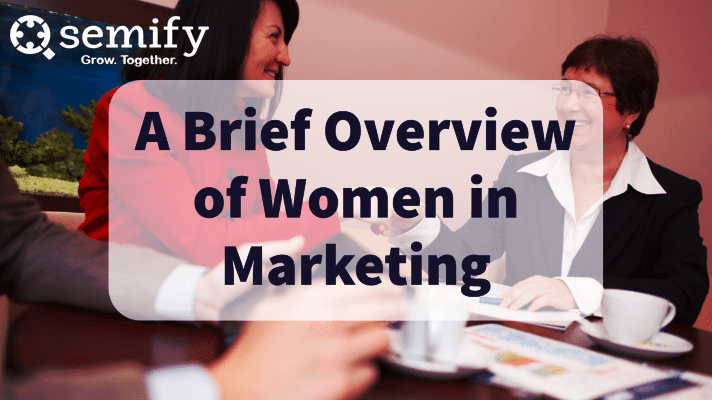
Although women really didn’t start to become a common presence in marketing agencies until more recently, it’s important to take a look at some of the first women who shaped marketing and advertising as we know them today.
In 1880, the M.C. Weil Agency was started by Mathilde C Weil. The J. Walter Thompson ad agency made a decision to be more inclusive (before that term was even invented) when the company introduced an all-women team of copywriters known as the Women’s Editorial Department in 1910. By 1918, that department accounted for more than half of the agency’s earnings at a time when it was considered to be the number one ad agency nationwide. In 1912, the League of Advertising Women was established to promote advertising opportunities for women who wanted to make a career in the traditionally male-dominated field.
In the 1920s, Nedda McGrath of the Blackman Agency became the first woman art director in the United States. In the middle of the decade, Bernice Fitz-Gibbon coined a popular advertising slogan for Macy’s, “It’s smart to be thrifty.” By the 1940s, women with advertorial backgrounds were being named Vice Presidents at successful agencies. And in 1952, copywriter Erma Perham Proetz became the first woman to be inducted into the Advertising Hall of Fame. The 1960s and 1970s saw women starting their own agencies, while the Women and Advertising in Washington organization and the Network for Professional Women were created in 1979.
It’s because of these women working in traditional advertising and marketing that others were able to make strides in the digital sphere. Let’s meet some of the most prolific women in digital marketing.
Identifying Iconic Women in Digital Marketing
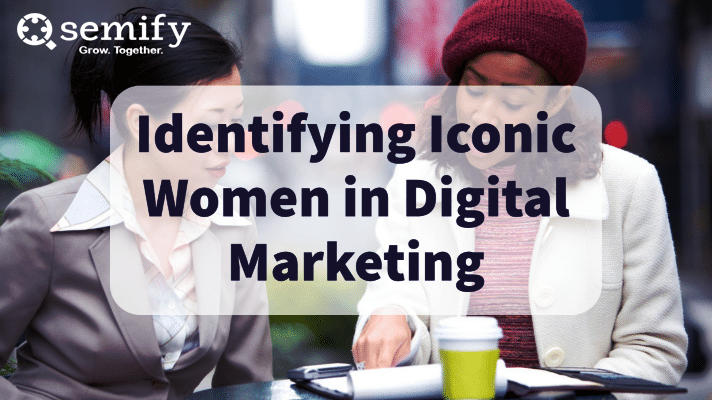
Of course, digital marketing didn’t really emerge until the 1990s when access to the internet became widespread. Email marketing quickly caught on as an effective tactic, as did digital ads and even the earliest versions of search engine optimization. Since then, the digital marketing sphere has exploded (especially because everyone now has access to a small computer in their pocket). And if you want to succeed in the digital marketing realm, you’ll want to look to these women for guidance.
Ann Handley
You’d be hard-pressed to find a list of influential women in digital marketing that doesn’t include Ann Handley. Known as the Chief Content Officer at the firm Marking Profs, Handley sold a successful company in 2000 and has become a prolific keynote speaker after spending nearly two decades in the marketing sector. She’s been recognized by Forbes as the most influential woman in social media and by ForbesWoman as one of the top 20 woman bloggers. She’s also a columnist for Entrepreneur Magazine and the co-author of Content Rules: How to Create Killer Blogs, Podcasts, Videos, Ebooks, Webinars (and More) That Engage Customers and Ignite Your Business.
Sheryl Sandberg
Although a controversial figure, Sheryl Sandberg’s influence on digital marketing is undeniable. When she was recruited away from Google to become the COO of Facebook in 2008, Sandberg was brought in to make the social media network truly profitable. She was an undeniable success in her role, growing Facebook’s revenues from $150 million in 2007 to $3.7 billion by 2011. She subsequently became the first woman to join the board of directors at Facebook and published the popular book Lean In: Women, Work, and the Will to Lead in 2013. Although the book has received its fair share of criticism in recent years, Sandberg wrote her second book, Option B: Facing Adversity, Building Resilience, and Finding Joy, in 2017 following her husband’s death and has been credited with making positive changes to employee bereavement leave at Facebook. Despite the fact that Facebook became embroiled in the 2016 presidential election scandal, Sandberg is still highly regarded among her peers and is regularly cited in publications as an industry leader in the world of digital marketing.
Beverly Jackson
Beverly Jackson recently began her role as the VP of global brand and consumer marketing at Twitter, but she’s been involved in the industry for over two decades. Formerly the VP of Franchise Communication and Social at Activision Blizzard and the VP of Social Portfolio Strategy at MGM Resorts International, Jackson is known as a dynamic public speaker and a fan of disruptive marketing tactics. The charismatic marketer has managed major campaigns and partnerships with some of the most well-known entertainment brands in the world and is certainly one to watch on social media.
Melanie Deziel
The founder and Chief Content Officer of brand content agency Storyfuel, Melanie Deziel aims to help companies tell more compelling stories and think more like journalists in an effort to create more authentic and intriguing branded content. A popular keynote speaker, Deziel has also made frequent appearances on a number of marketing podcasts and is revered as one of the leading experts in native advertising. She’s also the author of the best-selling book The Content Fuel Framework: How to Generate Unlimited Story Ideas. TopRank recently named Deziel as one of the top 50 influential women in content marketing.
Rhea Drysdale
Rhea Drysdale is the co-founder and CEO of digital marketing firm Outspoken Media and has also served as an author for Search Engine Journal. Notably, Drysdale won a major trademark opposition suit against Jason Gambert, who applied to protect the term “SEO” for his own gain. Thus, she’s actually credited with ensuring that SEO remains accessible to all. Drysdale has also spoken at a variety of well-known digital marketing conferences and was recognized as being one of Albany Business Review’s “40 Under 40.”
Amy Vernon
Amy Vernon is a blogger and social media expert who has been featured in Forbes, the New York Times, and the Wall Street Journal. She spent 20 years as a newspaper journalist and went on to specialize in audience development, community engagement, and product development, among other things. She now serves as the director of brand and digital strategy for a hedge fund manager and continues to run her successful blog. In her spare time, she speaks at major events like SXSW Interactive and Social Media Week.
Tyrona Heath
B2B marketing expert Tyrona Heath currently serves as the Global Lead for the B2B Institute at LinkedIn. Her experience includes working at Google and consulting with IBM, as well as serving on the Digital Marketing Institute’s Global Advisory Council and the Diversity and Inclusion Council for Adweek, along with running her own B2B consulting firm. Heath is also the founder of Marketers of Tomorrow and the co-founder of TransformHER. An author, coach, mentor, and diversity champion, Heath is known as a true thought leader.
Samantha Barry
Samantha Barry is now known as the Editor-in-Chief of Glamour who has lifted the magazine’s digital readership to new heights. But the natural-born storyteller also worked as the head of social media and senior director of strategy at CNN for nearly four years. Since she began at Glamour in 2018, she’s been credited for growing its monthly unique viewers to 6.3 million and YouTube subscriber base by more than 110%. Applauded by notoriously hard-to-please Anna Wintour, Barry was also responsible for CNN’s receipt of both a Webby Award and an Edward R. Murrow Award for social media excellence following their online coverage of the 2016 presidential election.
Purna Virji
Rounding out our list of influential women in digital marketing is Purna Virji, the Senior Manager of Global Engagement at Microsoft. A specialist in search engine optimization and search engine marketing, Virji was named as one of the top women in digital marketing by Search Engine Journal in 2017 and was cited as the world’s most influential personality in PPC by PPCHero. A frequent keynote speaker, Virji’s impressive knowledge of AI and voice search has solidified her place as an industry leader.
Supporting the Careers of Women in Digital Marketing
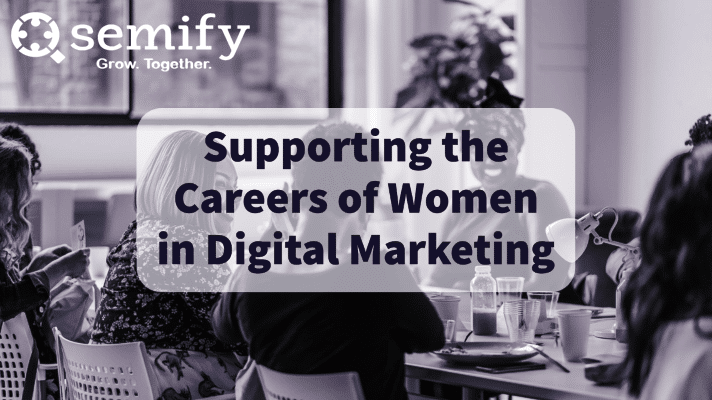
It’s clear that women have played an essential role in the marketing industry and in digital marketing, in particular. Even at our relatively small firm, women represent over 60% of our team. While it’s clear that we can always do more, particularly in terms of creating more management and leadership roles for women and committing to even more diversity and inclusion throughout the company, we’re proud of the incredible accomplishments that the women of Semify continue to make.
We also make it a point to partner with women-owned businesses as part of our reseller program and to read and apply the insights of women in leadership, including Brené Brown, Amy Edmondson, and Kim Scott. When we embarked on the journey to rebrand our business in 2019 and 2020, we were fortunate enough to work with Michelle Roberts at Novus Be Known, a woman-owned brand strategy firm based in our hometown of Rochester, NY.
Although International Women’s Day and Women’s History Month happen each March, we make sure to carry the values of empowerment, representation, and equality here at Semify through our policies of paid family leave, eliminating the gender pay gap, and creating a physically and psychologically safe space for all. We invite you to reflect on the accomplishments of the women in your business, to consider the improvements you can make to support their aspirations, and to gain inspiration from all of the phenomenal women in digital marketing who paved the way.